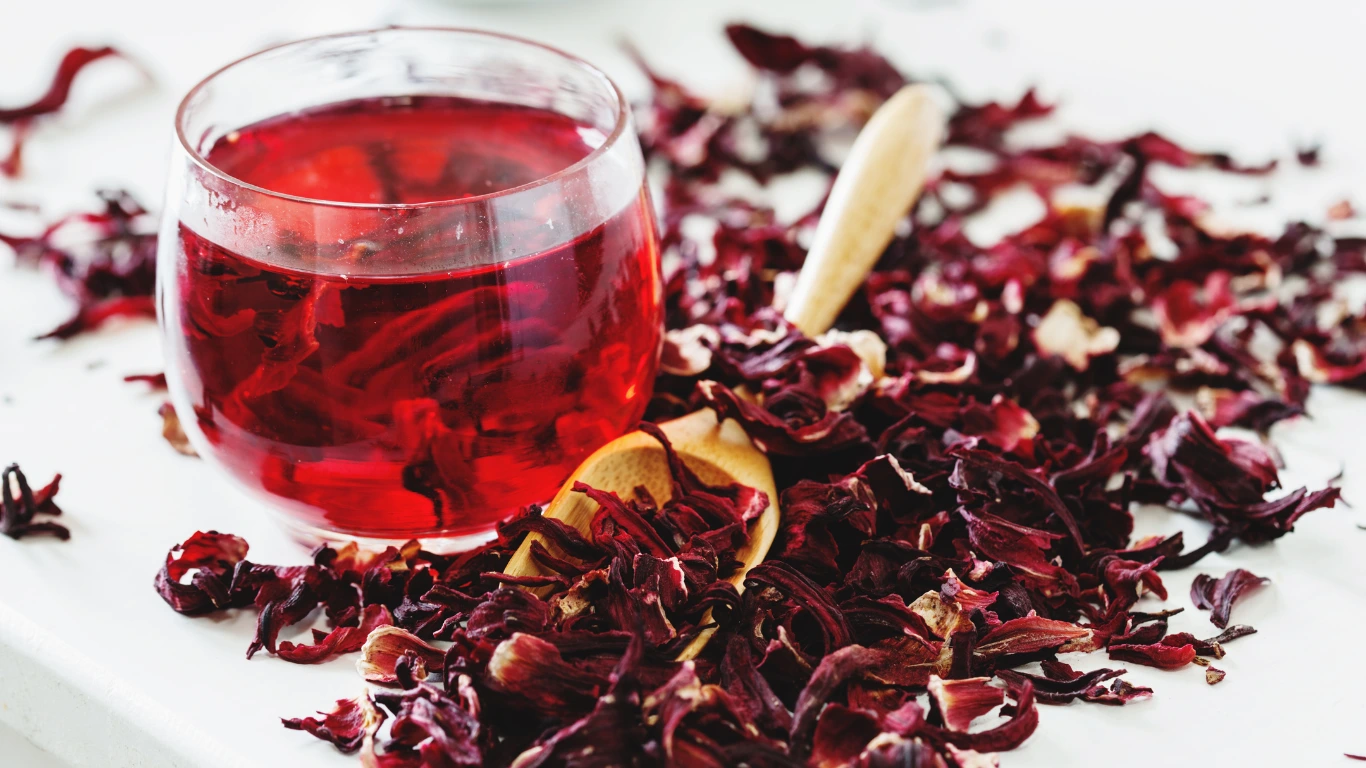We’re going on an adventure to learn about something cool: “Hibiscus Tea and How It Helps with Belly Fat.” Imagine having a drink that can make your tummy slimmer! We all want to be healthy, right? Well, belly fat can be a bit tricky, but hibiscus tea might be able to help.
We’ll find out how it works and what makes it so special. So, let’s start our exciting journey to discover this amazing tea together! remedy is hibiscus tea.
The Power of Hibiscus Tea
Hibiscus tea is derived from the dried calyces of the hibiscus plant, offering a tart, cranberry-like flavor and a striking red hue. Recent studies suggest that consuming hibiscus tea may aid in reducing belly fat and promoting weight loss.
How Does Hibiscus Tea Help With Belly Fat?
Hibiscus tea may support weight loss and target stubborn belly fat through various mechanisms:
Lowering Absorption of Fats and Carbs
Research indicates that hibiscus tea may inhibit the activity of pancreatic amylase and lipase enzymes, responsible for breaking down carbohydrates and fats during digestion. By hindering these enzymes, hibiscus tea may reduce the absorption of dietary fats and carbs, encouraging fat burning instead of storage around the abdominal area.
Boosting Fat Breakdown
The presence of polyphenols and flavonoids in hibiscus tea could activate fat-burning hormones, including adiponectin. Higher levels of adiponectin are associated with reduced body fat, particularly around the midsection. Additionally, hibiscus antioxidants may stimulate fat breakdown by enhancing thermogenesis and fat oxidation.
Reducing Inflammation and Swelling
Chronic inflammation contributes to the accumulation of visceral fat in the belly. Hibiscus tea, rich in anthocyanins and vitamin C, possesses anti-inflammatory properties that may alleviate puffiness, bloating, and swelling in the abdomen, resulting in a slimmer appearance.
Acting as a Natural Diuretic
Hibiscus tea serves as a mild diuretic, increasing urine output. This assists in eliminating excess water weight and reducing abdominal bloating, ultimately helping to flatten and tone the tummy. However, it’s crucial to maintain proper hydration when consuming hibiscus tea to ensure safe and healthy weight loss.
Key Active Compounds in Hibiscus Tea
Several naturally occurring compounds in hibiscus flowers are believed to be responsible for their effectiveness in reducing abdominal obesity:
- Anthocyanins: These plant pigments possess antioxidant and anti-inflammatory properties, potentially reducing inflammation-related obesity.
- Polyphenols: These antioxidants may activate fat-burning hormones and enzymes like adiponectin and AMPk.
- Flavonoids: Similar to other polyphenols, flavonoids in hibiscus can boost thermogenesis and fat breakdown.
- Organic acids: Citric, malic, tartaric, and hibiscus acids act as natural diuretics, reducing bloating.
- Vitamin C: Ascorbic acid in hibiscus tea stimulates anti-stress and fat-burning hormones like cortisol and norepinephrine.
The combination of these key nutrients makes hibiscus tea a potential powerhouse for fighting abdominal obesity.
Research Evidence on Hibiscus Tea and Belly Fat
Scientific studies offer compelling evidence supporting the beneficial effects of hibiscus tea on abdominal fat:
- A 2015 study observed that consuming hibiscus extract for 12 weeks resulted in reduced body fat, including visceral abdominal fat, in overweight participants. Waist-to-hip ratio also decreased significantly.
- In a 2014 animal study, obese mice given hibiscus extract for 60 days accumulated less body fat compared to control mice. The hibiscus group also exhibited lower blood fat levels.
- A 2010 study reported that drinking two cups of hibiscus tea daily for six weeks significantly reduced waist circumference in the tea-drinking group compared to the control group.
- A systematic review in 2020 concluded that hibiscus tea may effectively reduce abdominal fat, body weight, and body mass index (BMI). However, more rigorous human trials are still needed to confirm these findings.
While the current evidence for hibiscus tea is promising, it’s essential to acknowledge that most studies are relatively small or conducted on animals. Further research is necessary to conclusively establish its weight loss effects in humans. Nevertheless, hibiscus tea is generally safe for consumption, with minimal side effects for most individuals.
Tips for Using Hibiscus Tea to Lose Belly Fat
To harness the potential of hibiscus tea in your journey to shed belly fat, consider these tips:
- Consume 2-3 cups of organic hibiscus tea daily, either hot or cold. Iced hibiscus tea can be particularly refreshing during the summer months.
- Enjoy the tea between meals rather than with meals to avoid interfering with food absorption.
- Brew potent hibiscus tea using 2 tablespoons of dried flowers per one cup (8 oz) of hot water. Allow it to steep for 5-10 minutes to maximize the extraction of active compounds.
- Refrain from adding sugar to your tea to prevent unnecessary calorie intake. If you crave sweetness, consider using stevia or monk fruit.
- Experiment with combining hibiscus tea with other slimming teas, such as green tea, ginger tea, or cinnamon tea, to enhance the fat-burning effects.
- Complement your hibiscus tea regimen with a calorie-controlled diet, increased physical activity, and other lifestyle adjustments to achieve significant and sustainable weight loss.
Conclusion
Hibiscus tea stands out as a delightful and natural option that may accelerate the loss of belly fat when incorporated into a balanced diet and exercise routine. Its rich antioxidant content and other active compounds hold promise for boosting fat metabolism, reducing inflammation, suppressing appetite, and alleviating abdominal bloating. While further research in humans is needed to solidify these findings, hibiscus tea offers a safe and refreshing way to target stubborn tummy fat.
Consider including hibiscus tea in your daily routine, but exercise caution to avoid excessive consumption, as high doses may lead to side effects. As with any new dietary change, consult with your healthcare provider if you have underlying health conditions or concerns.
